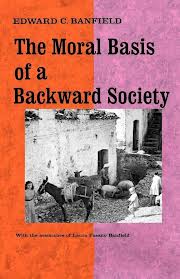With Laura Fasano, Glencoe, IL: The Free Press, 1958.
“This small book packs a terrific punch…. It describes a village near Potenza in southern Italy, where only officials specifically appointed for that purpose do anything for the community. The author inquires why this is so. He examines and discards as only partially applicable six explanations often advanced: poverty, ignorance, exploitation by the upper class, conservatism, distrust of the state and all authority, and despairing fatalism. Poverty and class antagonism he discusses at greater length before presenting his own explanation of the lack of any sense of community obligation or of public spirit. He summarizes his ideas in the term “amoral familism,” which at first seems more confusing than helpful but means that questions of right and wrong apply only to one’s immediate family (the in-group) and that “anything goes” with the out-group. The author puts it as a hypothesis: Maximize the material, short-run advantage of the nuclear family; assume that all others will do likewise. — Irwin T. Sanders

